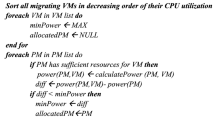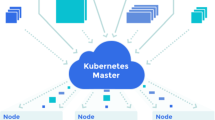Abstract
With the uncertainty of a cloud environment and the diversity of workload requirements increasing the scheduling cost of container-based cloud, especially for load spikes of application access, optimizing the utilization efficiency of cloud resources and quality of service is the focus of container cluster technology in the future. Different from traditional virtual machine-based scheduling, containerized applications of heterogeneous workloads bring higher scheduling complexity with its elastic scaling and multi-replicas operation. To tackle this problem, we propose a priority-aware workloads scheduling algorithm PA-CCWS. Firstly, we implement workload characterization and behavior identification, quantify the analysis results with TOPSIS method, generate the workloads priority and build priority scheduling buffer queue. Meanwhile, the model learning is accelerated by the experience replay mechanism that inserts and updates the priority of historical experience through the real-time feedback of actual container scheduling from DDQN. Then, we describe containerized applications oriented deep reinforcement learning scheduling algorithm which combined with the two kinds of priorities, to optimize scheduling decision. Finally, we evaluate the effectiveness of our algorithm in terms of resource utilization, resource imbalance degree and SLA compliance rate, etc. Compared with meta-heuristic algorithm PSOS, mathematical model-based algorithm KCSS and other excellent deep reinforcement learning based scheduling algorithms such as DeepRM-Plus and RLSched applying in the container-based cloud, PA-CCWS shows better resource utilization efficiency and convergence stability in containerized applications scheduling.















Similar content being viewed by others
References
Xie XL, Wang Q (2020) A scheduling algorithm based on multi-objective container cloud task. J Shandong Univ (Eng Sci) 50(04):14–21
Potdar AM, Narayan DG, Kengond S, et al. (2020) Performance evaluation of docker container and virtual machine. Procedia Comput Sci 171(04):1419–1428
Zhang Q, I T Department (2018) Research and design of CaaS management platform architecture based on docker. Comput Appl Softw
Zhang Q, Liu L, Pu C, et al. (2018) A comparative study of containers and virtual machines in big data environment. In: 2018 IEEE 11th international conference on cloud computing (CLOUD), pp 178–185
Tao Y, Wang X, Xu X, et al. (2017) Dynamic resource allocation algorithm for container-based service computing. In: IEEE 13th international symposium on autonomous decentralized system (ISADS), pp 61–67
Lu YC (2020) Research and implementation of container scheduling on container cloud platform. Dalian Univ Technol :1–53
Dezhabad N, Ganti S, Shoja G (2019) Cloud workload characterization and profiling for resource allocation. In: 2019 IEEE 8th international conference on cloud networking (CloudNet), pp 1–4. https://doi.org/10.1109/CloudNet47604.2019.9064138
Gu Z, Tang S, Jiang B, et al. (2021) Characterizing job-task dependency in cloud workloads using graph learning. In: 2021 IEEE international parallel and distributed processing symposium workshops (IPDPSW), pp 288–297. https://doi.org/10.1109/IPDPSW52791.2021.00052https://doi.org/10.1109/IPDPSW52791.2021.00052
Guo J, Chang Z, Wang S, et al. (2019) Who limits the resource efficiency of my datacenter: an analysis of Alibaba datacenter traces. The International Symposium
Lu C, Ye K, Xu G et al (2017) Imbalance in the cloud: an analysis on Alibaba cluster trace. In: 2017 IEEE international conference on big data (Big Data), pp 2884–2892
Iqbal W, Erradi A, Mahmood A (2018) Dynamic workload patterns prediction for proactive auto-scaling of web applications. J Netw Comput Appl :94–107
Jassas M, Mahmoud QH (2018) Failure analysis and characterization of scheduling jobs in google cluster trace. In: 2018 - 44th annual conference of the IEEE industrial electronics society, IEEE
Raith PA (2021) Container scheduling on heterogeneous clusters using machine learning-based workload characterization. Ph.D. Dissertation. Wien
Shishira SR, Kandasamy A, Chandrasekaran K (2017) Workload characterization: survey of current approaches and research challenges. In: Proceedings of the 7th international conference on computer and communication technology, pp 151–156
Xie XL, Zhang ZZ, Zhang QQ, et al. (2019) Container cloud resource prediction based on APMSSGA-LSTM. Big Data Res 5(1):1–11
Shi ZH (2018) Research on load prediction of cloud computing based on IABC algorithm. Comput Meas Control 26(09):195–199
Xie XL, Zhang ZZ, Wang JW, et al. (2019) Cloud resource prediction model based on triple exponential smoothing method and temporal convolutional network. J Commun 40(08):143–150
Chan S, Oktavianti I, Puspita V (2019) A deep learning CNN and AI-tuned SVM for electricity consumption forecasting: multivariate time series data. In: 2019 IEEE 10th annual information technology, electronics and mobile communication conference (IEMCON), pp 0488–0494
Zhou MS, Dong XS, Chen H et al (2020) Dynamically fine-grained scheduling method in cloud environment. J Softw 31(12):1–19
Zhang Y, Hua W, Zhou Z et al (2021) Sinan: ML-based and QoS-aware resource management for cloud microservices. In: Proceedings of the 26th ACM international conference on architectural support for programming languages and operating systems, pp 167–181
Lee WY, Lee Y, Song WW et al (2021) Harmony: a scheduling framework optimized for multiple distributed machine learning jobs. In: 2021 IEEE 41st international conference on distributed computing systems (ICDCS), pp 841–851
Gholipour N, Arianyan E, Buyya R (2020) A novel energy-aware resource management technique using joint VM and container consolidation approach for green computing in cloud data centers. Simul Model Pract Theory 104:102127
Tan B, Ma H, Mei Y (2019) Novel genetic algorithm with dual chromosome representation for resource allocation in container-based clouds. In: 2019 IEEE 12th international conference on cloud computing (CLOUD), pp 452–456
Tao Y, Wang X, Xu X et al (2017) Dynamic resource allocation algorithm for container-based service computing. In: 2017 IEEE 13th international symposium on autonomous decentralized system (ISADS), pp 61–67
Menouer T (2021) KCSS: kubernetes container scheduling strategy. J Supercomput 77 (05):4267–4293
Li H, Wang X, Gao S et al (2020) A service performance aware scheduling approach in containerized cloud. In: 2020 IEEE 3rd international conference on computer and communication engineering technology (CCET), pp 194–198
Lin M, Xi J, Bai W, et al. (2019) Ant colony algorithm for multi-objective optimization of container-based microservice scheduling in Cloud. IEEE Access 7:83088–83100
Sami H, Mourad A, Otrok H, Bentahar J (2020) FScaler: automatic resource scaling of containers in fog clusters using reinforcement learning. In: 2020 international wireless communications and mobile computing (IWCMC), pp 1824–1829. https://doi.org/10.1109/IWCMC48107.2020.9148401
Zhang S, Wu T, Pan M et al (2020) A-SARSA: a predictive container auto-scaling algorithm based on reinforcement learning[C]. In: 2020 IEEE international conference on web services (ICWS), pp 489–497
Mao H, Alizadeh M, Menache I et al (2016) Resource management with deep reinforcement learning. In: Proceedings of the 15th ACM workshop on hot topics in netwforks
Guo W, Tian W, Ye Y et al (2020) Cloud resource scheduling with deep reinforcement learning and imitation learning. IEEE Internet Things J 8(5):3576–3586
Lorido-Botran T, Bhatti MK (2021) Adaptive container scheduling in cloud data centers: a deep reinforcement learning approach. In: International conference on advanced information networking and applications, pp 572–581
Wang B, Liu F, Lin W, Energy-efficient VM (2021) Scheduling based on deep reinforcement learning. Futur Gener Comput Syst 125:616–628
Li F, Hu B (2019) DeepJS: job scheduling based on deep reinforcement learning in cloud data center. In: Proceedings of the 2019 4th international conference on big data and computing, pp 48–53
Che H, Bai Z, Zuo R et al (2020) A deep reinforcement learning approach to the optimization of data center task scheduling. Complexity :1–12
Zhou G, Tian W, Buyya R (2021) Deep reinforcement learning-based methods for resource scheduling in cloud computing: a review and future directions. arXiv preprint arXiv :1–18
Sutton RS, Barto AG (2018) Reinforcement learning: an introduction. MIT press, Cambridge
Legay A, Sedwards S, Traonouez LM (2014) Scalable verification of Markov decision processes. In: International conference on software engineering and formal methods, pp 350–362
Song S, Ma S, Zhao J et al (2022) Cost-efficient multi-service task offloading scheduling for mobile edge computing. Appl Intell 52(4):4028–4040
Xia P, Zhang L, Li F (2015) Learning similarity with cosine similarity ensemble. Inf Sci 307:39–52
Opricovic S, Tzeng GH (2004) Compromise solution by MCDM methods: a comparative analysis of VIKOR and TOPSIS. Eur J Oper Res 156(2):445–455
Duryea E, Ganger M, Wei H (2016) Deep reinforcement learning with double Q-learning
Shriniwar AP (2020) Container Scheduling Using TOPSIS Algorithm. National College of Ireland, Dublin
Schaul T, Quan J, Antonoglou I et al (2015) Prioritized experience replay. arXiv:1511.05952
Alibaba Inc (2018) Alibaba production cluster data v2018. Website. https://github.com/alibaba/-clusterdata/tree/v2018. Accessed 12 Nov 2021
Author information
Authors and Affiliations
Corresponding author
Additional information
Publisher’s note
Springer Nature remains neutral with regard to jurisdictional claims in published maps and institutional affiliations.
Kai Huang, Kun Fu, Yanfeng Hu and Yang Wang are contributed equally to this work.
Rights and permissions
Springer Nature or its licensor holds exclusive rights to this article under a publishing agreement with the author(s) or other rightsholder(s); author self-archiving of the accepted manuscript version of this article is solely governed by the terms of such publishing agreement and applicable law.
About this article
Cite this article
Zhu, L., Huang, K., Fu, K. et al. A priority-aware scheduling framework for heterogeneous workloads in container-based cloud. Appl Intell 53, 15222–15245 (2023). https://doi.org/10.1007/s10489-022-04164-1
Accepted:
Published:
Issue Date:
DOI: https://doi.org/10.1007/s10489-022-04164-1




